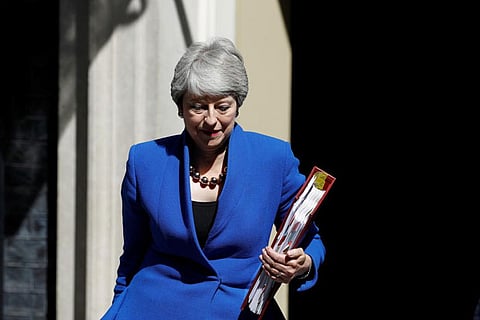

London
The 62-year-old outgoing British Prime Minister spoke of the "heavy honour" of having served as Prime Minister of the UK and wished her successor, Boris Johnson, the best in his endeavour to see the country through the crucial challenge of leaving the European Union (EU).
"Their successes will be our country's successes," she said of Johnson and her other future successors in the post of British prime minister.
"Brexit must be finished in a way that works for the whole of the UK. Then Britain can move to a bright future," she said, in her final speech at Downing Street.
May took over as Britain second female PM, since Margaret Thatcher, after David Cameron resigned as Conservative Party leader and Prime Minister in the wake of the June 2016 referendum with a "Brexit means Brexit and we will make a success of it".
Besides an expression of gratitude to her staff, to people in Parliament, in the armed forces, and to public servants, she also expressed the hope that young girls have seen her and thought there is nothing they cannot achieve.
"Thank you for putting your faith in me and giving me the chance to serve," she said.
In the midst of her speech a self-styled "Mr Stop Brexit" campaigner is loudly heard shouting "Stop Brexit", to which May mockingly responded: "I think not".
Earlier, she was given a standing ovation by her Conservative Party MPs as she concluded her final Prime Minister's Questions in the House of Commons on Wednesday, marking a conclusion of her three-year premiership as she makes way for Boris Johnson to take charge at Downing Street.
The UK is expected to leave the 28-member European Union on October 31. May resigned last month amid a mounting rebellion from within the Conservative Party against her Brexit plan.
In a largely light-hearted exchange in the UK Parliament, the outgoing Prime Minister's voice broke towards the end of the session as a visibly emotional May made her way out of the Commons amid back slapping from many of her party members.
"We are living through extraordinary political times and this House of Commons is rightly at the centre of those events and that is because of the vital link between every single member of this House and the communities that we represent," May told MPs.
"Each one of us, wherever we sit, whatever we stand for, can take pride in that. And that duty, to serve my constituents will remain my greatest motivation," she said, as she paid tribute to her husband Philip May and also indicated her plan to continue working as an MP for her constituency of Maidenhead from the backbenches.
In a barbed comment directed at the Opposition Labour leader, Jeremy Corbyn, whom she has repeatedly clashed with in Parliament, May added: “Perhaps I could just finish my exchange with him by saying this: as a party leader who has accepted when her time was up, perhaps the time is now for him to do the same?” The outgoing leader also offered a mild endorsement of Johnson, one of her most vocal critics over Brexit – having resigned from her Cabinet as foreign secretary last year over his firm opposition to her strategy for Britain's exit from the European Union (EU).
"I am pleased to hand over to an incoming leader of the Conservative party and Prime Minister, who I worked with when he was in my Cabinet, and who is committed as a Conservative, who stood on a Conservative manifesto in 2017 to delivering on the [Brexit] vote of the British people in 2016 and to delivering a bright future for this country," she said.
However, the challenge proved unsurmountable after she called a General Election in June 2017 and lost the Conservative Party's already small majority, instead having to rely on the Northern Irish Democratic Unionist Party's (DUP) 10 MPs to lead a Tory-led government.
The adverse parliamentary arithmetic meant that she lost crucial votes on her Brexit agreement three times in the Commons, each vote loosening her grip on power as the rebellion within her own party kept mounting.
Johnson, who will become the 14th British Prime Minister to be appointed by Queen Elizabeth II, will inherit some of the similar complexities of the British Parliament and divisions over Brexit.
Visit news.dtnext.in to explore our interactive epaper!
Download the DT Next app for more exciting features!
Click here for iOS
Click here for Android